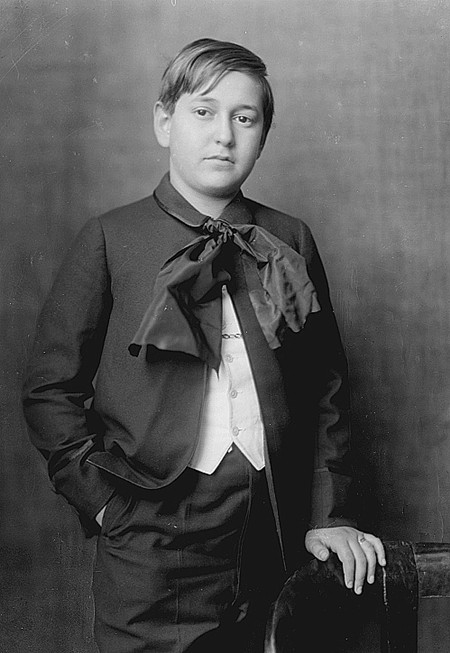
Browsing through some music videos a couple of days ago, I came across a performance by a violinist of about six years old who was described as a “child prodigy”. He was talented, but he wasn’t a child prodigy. Nowhere near. I think the word “prodigy” is used a bit too generously these days to describe children who are exceptionally talented but certainly not in the prodigy class. A prodigy is usually defined as a child who has reached adult or even professional levels of musical understanding, attitudes and performance before the age of ten. The pianist Van Cliburn, who started playing piano at the age of three, once described child prodigies as “having extraordinary vision and unusual prescience, amazingly aware of the world at an early age.”
Music seems to have more than its fair share of child prodigies and includes the composers Barber, Bizet, Chopin, Menotti, Paganini and Purcell. The most famous perhaps were Mozart and Mendelssohn. Science knows remarkably little about the mental functioning of these extraordinary beings, though there is no shortage of theories. The issue inevitably brings up the time-worn “nature vs. nurture” debate, which is about whether potential high levels of skill are already present when the child is born or whether they’re brought about by the child’s early environment. I’d guess that both nature and nurture have a role to play.
Psychologist Joanne Ruthsatz of Ohio State University has estimated that there’s one child prodigy to every five million, or possibly ten million children. The Ohio research has shown that a common denominator is an exceptional working memory. Such children also have an intense, obsessive attention to detail and an elevated general intelligence. Interestingly, they tend to be far more altruistic than most other people. Contrary to popular belief, child prodigies don’t usually fade away in their adult years. Many prodigies have lived into their eighties and nineties and continued performing careers until towards the end of their lives.
Felix Mendelssohn (1809-1847): Symphony for Strings No.10 in B minor. Amsterdam Sinfonietta (Duration: 10:50; Video: 1080p HD)
Mendelssohn was fourteen when he completed this sparkling symphony in the spring of 1823. The German poet Johann Wolfgang von Goethe considered the young Mendelssohn superior to Mozart at the same age. Even today, some historians regard the quality of his music during his early teens shows a greater sophistication than that of Mozart at a comparable age. Of course, Mendelssohn was writing fifty years later and would have already studied the finest works that Mozart and Haydn produced. So he did, after all, have a slight advantage. Nevertheless, this is wonderful music by any standards and stunningly original in concepts.
Mendelssohn’s previous symphonic works, the Eighth and Ninth string symphonies are expansive four-movement works lasting nearly half an hour each, while this tenth symphony is a short single movement work. Some writers have suggested that it was originally a full-length symphony like the previous two, though no evidence has yet been found. But just listen to the serene opening of this work: for a moment he takes us back in time to the late Baroque. But then a playful theme enters (01:47) with a lovely contrasting lyrical melody. The music is assured, confident and quite brilliant, from the hand of a teenager who was streets ahead of his contemporaries and destined to take his place among the greatest names in music.
Erich Wolfgang Korngold (1897-1957): Sinfonietta Op 5. Malaysian Philharmonic Orchestra, cond. Hannu Lintu (Duration: 44:53; Video: 480p)
Gustav Mahler described Erich Korngold as a musical genius. The boy composed this fine work at the age of fifteen. Four years earlier, he’d written his ballet Der Schneemann (“The Snowman”), first performed by the Hamburg Symphony Orchestra.
The Sinfonietta is an amazingly complex work for one so young. It was his first large-scale orchestral composition and the brilliantly orchestrated work is remarkable in its maturity and really sounds as though it was written by someone with many more years’ experience. There are some wonderful melodies and the beginning of the scherzo (at 11:17) is almost pure Hollywood.
Korngold of course later went to Hollywood and became a prolific composer of film music. It’s sometimes said that he “invented” film music because he treated each movie as an “opera without singing”, writing sumptuous melodies and contrapuntally intricate scores. Although his musical style sounds a bit dated nowadays, he had a significant influence on film music. In 1938 he won an Academy Award for his score to The Adventures of Robin Hood, the first composer to receive one.
For some reason, he eventually became disillusioned with the movie industry and in 1946 stopped writing film scores altogether, turning his attention to writing for the concert hall. But his music remained stylistically in the nineteenth century and one American critic unkindly described Korngold’s Violin Concerto as being “more corn than gold”. Honestly, how bitchy can you get?
 |
 |
 |





